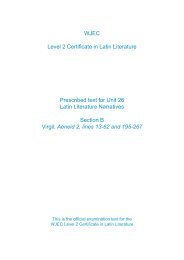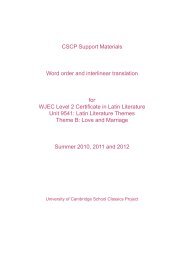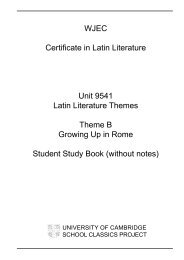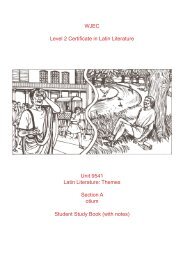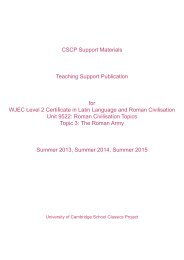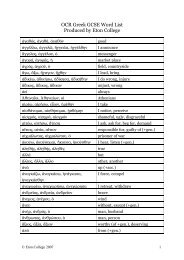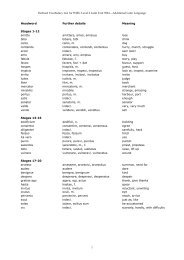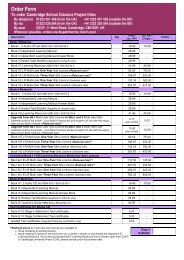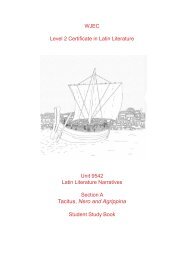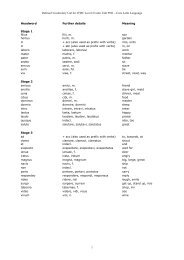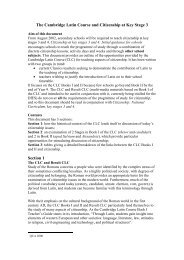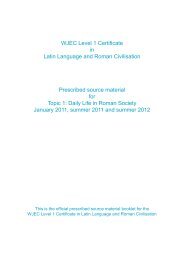Pliny, Letters 4.19, To Calpurnia Hispulla, his wife’s aunt – lines 16-19his ex causis est mihi spes certissima, perpetuam nobisconcordiam maioremque in dies futuram esse. illa enimdiligit non aetatem meam aut corpus, quae paulatimoccidunt ac senescunt, sed gloriam meam.16 hic, haec, hoc - thisex - for; out ofcausa, causae, f. - reasonsum, esse, fui - beego, mei - I, mespes, spei, f. - hopecertus, certa, certum - certainperpetuus, perpetua, perpetuum -everlasting, unendingnos - we, us17 concordia, concordiae, f. - harmonymaior, maius - greater, more substantial-que - andin - indies, diei, m. - future; daysum, esse, fui - beille, illa, illud - he, she, itenim - for18 diligo, diligere, dilexi, dilectus - lovenon - notaetas, aetatis, f. - agemeus, mea, meum - myaut - orcorpus, corporis, n. - bodyqui, quae, quod - who, whichpaulatim - little by little, gradually19 occido, occidere, occidi - declineac - andsenesco, senescere, senui - grow oldsed - butgloria, gloriae, f. - distinction, glorymeus, mea, meum - my88 WJEC Level 2 Latin Literature Unit 9541 Love and Marriage
50. Read lines 16-19 (aloud if possible) or listen to the audio on the CSCP website.51. <strong>Study</strong> the vocabulary.5<strong>2.</strong> Read lines 16-19 (or listen to the audio) again.CheckCheck53. A reminder that prepositions are often sandwiched between an adjective and a noun:hoc in templo = in hoc templo = in this templemultis cum amicis = cum multis amicis = with many friendsTranslate: (i) his in silvis(ii) totam per noctem(iii) his ex causis (line 16)54. What does Pliny say that he has?Notice the literal meaning of est mihi. Part of the verb esse is used with the dative case to mean there is forme … and so I have …What is the literal translation of the following simplified version of lines 16-17, which makes a similar use of partof esse combined with the dative:(futurus esse is the future infinitive of esse; the endings of futurus change like bonus.)spero perpetuam concordiam nobis futuram esse.55. Use your answer to question 54 as a starting-point for a natural translation of lines 16-17, beginning For thesereasons I have a most confident hope that we … What does he hope will happen in dies (as the days go by)?56* Summarising lines 7-15 in as few words as possible, what are the reasons (causae, line 16) for the hopeexpressed by Pliny in lines 16-17? (Hint: Do all Pliny’s favourable comments about Calpurnia have something incommon?)57. Who is illa (line 17)?58. From the point of view of emphasis and natural English, which of these translations of diligit non aetatemmeam aut corpus (line 18) do you prefer?(a) She does not love my age or my body …(b) She loves not my age or my body …(c) She loves me not for my age or my body …59. What comment does Pliny make about age and the body in lines 18-19?60. According to line 19, what does Calpurnia love him for? How does Pliny use word order to emphasise his point?61. Translate lines 16-19.Answers53. (i) In these woods(ii) All through the night or Through the whole night(iii) For these reasons54. I hope that there will be for us unending harmony.WJEC Level 2 Latin Literature Unit 9541 Love and Marriage 89
- Page 1:
WJECLevel 2 Certificate in Latin Li
- Page 4:
CIL 1.2.1211, Epitaph to Claudia -
- Page 7 and 8:
NotesWJEC Level 2 Latin Literature
- Page 9 and 10:
20. Read lines 5-8 (aloud if possib
- Page 11 and 12:
Follow your teacher's guidance over
- Page 13 and 14:
13. Read lines 4-8 (aloud if possib
- Page 15 and 16:
NotesWJEC Level 2 Latin Literature
- Page 17 and 18:
28. Read lines 8-11 (aloud if possi
- Page 19 and 20:
NotesWJEC Level 2 Latin Literature
- Page 21 and 22:
47. Read lines 11-14 (aloud if poss
- Page 23 and 24:
61. Read lines 14-18 (aloud if poss
- Page 25 and 26:
NotesWJEC Level 2 Latin Literature
- Page 27 and 28:
The poems of Catullus, who lived in
- Page 29 and 30:
NotesWJEC Level 2 Latin Literature
- Page 31 and 32:
27. Read lines 7-9 (aloud if possib
- Page 33 and 34:
37. Read lines 10-13 (aloud if poss
- Page 36 and 37:
Catullus, Poem 8 - lines 1-5miser C
- Page 38 and 39: 18. According to Catullus in line 3
- Page 40 and 41: Catullus, Poem 8 - lines 6-8ibi ill
- Page 42 and 43: Catullus, Poem 8 - lines 9-11nunc i
- Page 44 and 45: Catullus, Poem 8 - lines 12-15vale
- Page 46 and 47: Catullus, Poem 8 - lines 16-19quis
- Page 48 and 49: 82. Translate the last three words
- Page 50 and 51: Catullus, Poem 70nulli se dicit mul
- Page 52 and 53: (ii) The person who ought to do som
- Page 54 and 55: Catullus, Poem 72 - lines 1-4diceba
- Page 56 and 57: Catullus, Poem 72 - lines 5-8nunc t
- Page 58 and 59: Catullus, Poem 83 - lines 1-2Lesbia
- Page 60 and 61: Catullus, Poem 83 - lines 3-6mule,
- Page 62 and 63: 24. et in line 6 is more than just
- Page 64 and 65: Ovid, Ars Amatoria 1.469-478, Advic
- Page 66 and 67: 15. In time, what do these animals
- Page 68 and 69: Ovid, Ars Amatoria 1.469-478, Advic
- Page 70 and 71: 44. What is the literal translation
- Page 72 and 73: Martial, Epigrams 8.12, Marital equ
- Page 74 and 75: CheckCheckCheckTranslate these exam
- Page 76 and 77: Pliny, Letters 4.19, To Calpurnia H
- Page 78 and 79: Check12. Translate these examples:(
- Page 80 and 81: Pliny, Letters 4.19, To Calpurnia H
- Page 82 and 83: Pliny, Letters 4.19, To Calpurnia H
- Page 84 and 85: allowed in court (see question 30),
- Page 86 and 87: Pliny, Letters 4.19, To Calpurnia H
- Page 90 and 91: Pliny, Letters 4.19, To Calpurnia H
- Page 92 and 93: 77. The marriage (like Pliny’s tw
- Page 94 and 95: Pliny, Letters 6.24, Faithful unto
- Page 96 and 97: Pliny, Letters 6.24, Faithful unto
- Page 98 and 99: Check20. Another version of the wif
- Page 100 and 101: Pliny, Letters 6.24, Faithful unto
- Page 102 and 103: The following questions refer to Lo



